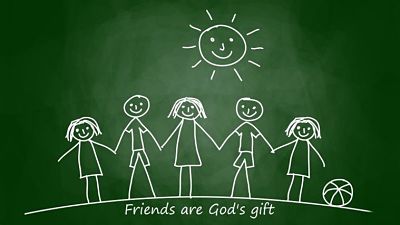Smile with the world. Connect with as many people as you can. We're born alone, we live alone, we die alone. Only through our love and friendship can we create the illusion for the moment that we're not alone.
Who is a friend ? A friend is someone who gives you total freedom to be yourself.
When you got more friends, life becomes a lot easier. Your troubles, your hurdles are there to share with your friends and calm you down, Free Your Mind. You will be never as happy as spending time with your true friends. I just visited my childhood friends after many years. We had a get together, and all our memories came alive. It was as if we are living that time, that moment once again. It is one of the blessings of old friends that you can afford to be stupid with them. It is laughter, It is joy and sharing of pleasures. The heart finds its morning and feels refreshed with old friends.
What is true friendship ?
True friendship multiplies the good in life and divides its evils. It makes pain more enjoyable, and dreams more fulfilling. It makes the journey of life easier.
A true friend is someone who is there for you when he'd rather be anywhere else. He is there at the time of your sorrow when no one else shows up. He is true to you by his soul. Strive to have friends, for life without friends is like life on a desert island... to find one real friend in a lifetime is good fortune; to keep him is a blessing. My best friend is the man who in wishing me well wishes it for my sake.
One loyal friend is worth ten thousand relatives.
- Euripides
A student came to a teacher and asked him, “Master, how many friends a person should have – one or a lot?”
“Everything is very simple,” the teacher answered, “pick me that red apple from the highest branch.”
The student looked up and answered, “But it’s too high, Teacher! I can’t reach it.”
“Ask a friend, maybe he will help you,” Master answered.
The student called another student and stood on his shoulders.
“I still can’t reach it, Teacher,” said the disappointed student.
“Don’t you have more friends?” the teacher smiled.
The student asked more friends who started standing up on each other’s shoulders and backs grunting, trying to build a live pyramid. But the apple was too high, the pyramid crumbled and the student wasn’t able to pick the longed apple.
Then the teacher called him back.
“So, did you understand how many friends a person needs?”
“I did, Teacher,” the student said, rubbing the injured sides, “o lot – so together we could solve any problem.”
“Yes,” the Master answered, shaking his head in disappointment, “of course you need a lot of friends. So that among all of these athletes there would be at least one smart person who would figure out to bring a ladder!”
Friends become increasingly important to health and happiness as people age, according to new research in the journal Personal Relationships. They're so crucial, in fact, that having supportive friendships in old age was found to be a stronger predictor of wellbeing than having strong family connections.
The new paper explores the findings of two studies about relationships. In the first, involving more than 270,000 people in nearly 100 countries, author William Chopik found that both family and friend relationships were associated with better health and happiness overall. But at advanced ages, in later years, the link remained only for people who reported strong friendships.
“I went into the research sort of agnostic to the role of friendship,” says Chopik, assistant professor of psychology at Michigan State University. “But the really surprising thing was that, in a lot of ways, relationships with friends had a similar effect as those with family—and in others, they surpassed them."
For the other study, Chopik analyzed a separate survey of nearly 7,500 older people in the U.S. Here, he found that it wasn’t just important to have friends, but that the quality of those friendships also mattered.
When people said their friends were a source of strain, they reported having more chronic illnesses. (Interestingly, that was not the case for people who reported strain from their spouses and children.) When their friends were a source of support, people were happier.
None of this is particularly surprising, says Chopik. After all, unlike our family, we can choose our friends. “A few studies show that we often enjoy our time with friends more than with family,” he says. “We do leisurely things with friends, whereas family events are often serious or maybe a little monotonous.”
The benefits of having close pals may also be stronger for older people because, by that point, those friendships have stood the test of time. “You have kept those people around because they have made you happy, or at least contributed to your wellbeing in some way,” says Chopik. “Across our lives, we let the more superficial friendships fade, and we’re left with the really influential ones.”
But Chopik says the power of friendship on physical and mental health is often ignored in research—especially in older people, where relationships with spouses and children are often considered more important.
And while it’s true that family members are often the people who provide caregiving support to the elderly, he says this can also create a sense of obligation. These relationships are certainly beneficial and often vital, Chopik adds. But they may not provide as much joy as those with long-time friends do.
Of course, some people can share powerful friendships with their siblings, spouses, children and other family members—and that’s a positive, too, says Chopik. “The general point is that the more support, the more positive interactions, the better,” he says. “The important thing is having people you can rely on, for the good times as well as the bad.”
In another research, the Gallup Organization’s director, Tom Rath, believes that we are all aware of the value of friendship especially during difficult times. In his book, Vital Friends: The People You Can’t Afford To Live Without, Rath makes the point that if you ask people why they became homeless, why their marriage failed or why they overeat, they often say it is because of the poor quality, or nonexistence, of friendships. They feel outcast or unloved.
The causes of modern social problems, from divorce to homelessness and obesity, are often thought to be based in areas such as poverty, stress or unhappiness. But researchers suggest we are overlooking something crucial: friendship. It would appear that our society is ignoring its importance.
Rath undertook a massive study of friendship, alongside several leading researchers. His work resulted in some surprising statistics: If your best friend eats healthily, you are five times more likely to have a healthy diet yourself. Married people say friendship is more than five times as important as physical intimacy within marriage. Those who say they have no real friends at work have only a one in 12 chance of feeling engaged in their job. Conversely, if you have a “best friend at work”, you are seven times more likely to feel engaged in your job.
The book "Vital Friends: The People You Can’t Afford To Live Without" recommends carrying out your own “friendship audit”, in order to recognize which of your friendships provide you with the different things you need, then to sharpen each friendship in line with its strength. Of course, it’s not always a good idea to judge friends in a detached way, or to doubt a friendship just because you can’t easily identify its rewards. The closest friends like each other for who they are in themselves, not for what they deliver. Our contemporary culture, for all its benefits, tends to focus more on commerce rather than to help us live a good and enjoyable life.
The philosopher Aristotle said, “In poverty and other misfortunes of life, true friends are a sure refuge. They keep the young out of mischief; they comfort and aid the old in their weakness, and they incite those in the prime of life to noble deeds.”
In fact, Aristotle made the point that it is better to give than to receive in friendship. Aristotle also believed that friendship can only arise indirectly, like happiness. It comes with living what he called a good life, including strong personal values such as honesty, character and passion.
British writer Mark Vernon found support for this idea. He quotes the philosopher Epicurus, “The noble man is most involved with wisdom and friendship.” Oscar Wilde also emphasized the altruistic aspect of true friendship when he said, “Anybody can sympathise with the sufferings of a friend, but it requires a very fine nature to sympathise with a friend’s success.”
In his search for the essence of friendship, Vernon explored a variety of definitions from well-known personalities. For example, Ralph Emerson said, “A friend is a person with whom I may be sincere.” Vernon’s book, The Philosophy of Friendship, makes the point that we have now established that money does not buy happiness. He suggests that we take the lead from Aristotle, and spend at least a fifth of our time with our friends. “Is this not what children do in their persistent requests to play with their friends?” he asks.
Vernon writes that a close friend is a mirror of your own self, someone with whom you realize that, though autonomous, you are not alone. He adds that friendship is also important in politics because it “cultivates the virtues, such as creativity and compassion, which are essential to a flourishing society”. He concludes that if we cultivate friendship, we can “lift some of the burden from our apparently unhappy, isolated selves”.
So, try to make good friends everywhere you go. Friendships are vital for wellbeing, but they take time to develop and can’t be artificially created. No wonder they are at risk of being neglected.
"I would rather walk with a friend in the dark, than alone in the light."
— Helen Keller



Great post, thanks for sharing. There's nothing more important than friendship. Have you seen this cute friendship jewelry? What do you think?
ReplyDelete